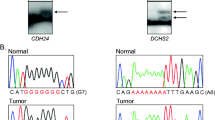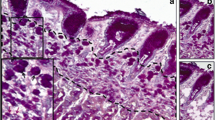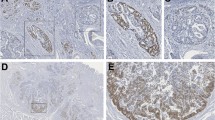Abstract
Background
The relationship between the expression of CD133 and fragile histidine triad (FHIT) or prognosis in Chinese colorectal adenocarcinoma is unknown and needs to be explored.
Material and methods
The samples of colorectal adenocarcinoma from 200 Chinese patients with follow-up were analyzed for the expression of CD133 and FHIT proteins by immunohistochemical method.
Results
CD133 was highly expressed in up to 42.0% (84/200) of this group of colorectal adenocarcinomas. The expression of CD133 was significantly higher in carcinoma than in normal (P = 0.0001) and in adenomatous mucosas (P = 0.004). CD133 positively corresponds to histological grade, clinical stage, regional lymphatic metastasis, and distant metastasis (all P < 0.05). The mean overall survival time was shorter in patients with CD133 high expression than in those with CD133 low expression (P = 0.0001). The expression of CD133 was inversely correlative with that of FHIT (r = −0.464, P = 0.0001) in colorectal adenocarcinoma. CD133 was an independent prognostic factor (P = 0.0001).
Conclusions
The expression of CD133 may be inversely correlated with the expression of FHIT. It is suggested that CD133 may play an important role in the evolution of colorectal adenocarcinoma and be considered as a potential marker for the prognosis.





Similar content being viewed by others
References
Jemal A, Siegel R, Ward E, Hao Y, Xu J, Murray T et al (2008) Cancer statistics. CA Cancer J Clin 58:71–96
Miraglia S, Godfrey W, Yin AH, Atkins K, Warnke R, Holden JT et al (1997) A novel five-transmembrane hematopoietic stem cell antigen: isolation, characterization, and molecular cloning. Blood 90:5013–5021
Hilbe W, Dirnhofer S, Oberwasserlechner F, Schmid T, Gunsilius E, Hilbe G et al (2004) CD133 positive endothelial progenitor cells contribute to the tumour vasculature in non-small cell lung cancer. J Clin Pathol 57:965–969
Singh SK, Hawkins C, Clarke ID, Squire JA, Bayani J, Hide T et al (2004) Identification of human brain tumour initiating cells. Nature 432:396–401
Zhou L, Wei X, Cheng L, Tian J, Jiang JJ (2007) CD133, one of the markers of cancer stem cells in Hep-2 cell line. Laryngoscope 117:455–460
Al-Hajj M, Wicha MS, Benito-Hernandez A, Morrison SJ, Clarke MF (2003) Prospective identification of tumorigenic breast cancer cells. Proc Natl Acad Sci U S A 100:3983–3988
Schrot RJ, Ma JH, Greco CM, Arias AD, Angelastro JM (2007) Organotypic distribution of stem cell markers in formalin-fixed brain harboring glioblastoma multiforme. J Neurooncol 85:149–157
Ricci-Vitiani L, Ricci-Vitiani L, Lombardi DG, Pilozzi E, Biffoni M, Todaro M et al (2007) Identification and expansion of human colon-cancer-initiating cells. Nature 445:111–115
O’Brien CA, Pollett A, Gallinger S, Dick JE (2007) A human colon cancer cell capable of initiating tumour growth in immunodeficient mice. Nature 445:106–110
Vermeulen L, Todaro M, de Sousa MF, Sprick MR, Kemper K, Perez Alea M et al (2008) Single-cell cloning of colon cancer stem cells reveals a multi-lineage differentiation capacity. Proc Natl Acad Sci U S A 105:13427–13432
Hibi K, Sakata M, Kitamura YH, Sakuraba K, Shirahata A, Goto T et al (2009) Demethylation of the CD133 gene is frequently detected in advanced colorectal cancer. Anticancer Res 29:2235–2237
Botchkina IL, Rowehl RA, Rivadeneira DE, Karpeh MS Jr, Crawford H, Dufour A et al (2009) Phenotypic subpopulations of metastatic colon cancer stem cells: genomic analysis. CANCER GENOMICS PROTEOMICS 6:19–29
Choi D, Lee HW, Hur KY, Kim JJ, Park GS, Jang SH et al (2009) Cancer stem cell markers CD133 and CD24 correlate with invasiveness and differentiation in colorectal adenocarcinoma. World J Gastroenterol 15:2258–2264
Horst D, Kriegl L, Engel J, Jung A, Kirchner T (2009) CD133 and nuclear beta-catenin: the marker combination to detect high risk cases of low stage colorectal cancer. Eur J Cancer 45:2034–2040
Horst D, Kriegl L, Engel J, Kirchner T, Jung A (2008) CD133 expression is an independent prognostic marker for low survival in colorectal cancer. Br J Cancer 99:1285–1289
Kojima M, Ishii G, Atsumi N, Fujii S, Saito N, Ochiai A (2008) Immunohistochemical detection of CD133 expression in colorectal cancer: a clinicopathological study. Cancer Sci 99:1578–1583
Smith LM, Nesterova A, Ryan MC, Duniho S, Jonas M, Anderson M et al (2008) CD133/prominin-1 is a potential therapeutic target for antibody-drug conjugates in hepatocellular and gastric cancers. Br J Cancer 99:100–109
Wang DS (2009) Epidemiologic trend of and strategies for colorectal cancer. Ai Zheng 28:897–902
Wang Q, Chen ZG, Du CZ, Wang HW, Yan L, Gu J (2009) Cancer stem cell marker CD133+ tumour cells and clinical outcome in rectal cancer. Histopathology 55:284–293
Ohta M, Inoue H, Cotticelli MG, Kastury K, Baffa R, Palazzo J et al (1996) The FHIT gene, spanning the chromosome 3p14.2 fragile site and renal carcinoma-associated t(3;8) breakpoint, is abnormal in digestive tract cancers. Cell 84:587–597
Cao J, Chen XP, Li WL, Xia J, Du H, Tang WB et al (2007) Decreased fragile histidine triad expression in colorectal cancer and its association with apoptosis inhibition. World J Gastroenterol 13:1018–1026
Lü Y, Liu L, Zhao P (2008) Expression of nuclear factor-kappa-B/P65 and fragile histidine triad in colorectal carcinoma and clinical significance thereof. Zhonghua Yi Xue Za Zhi 88:610–614
Hao XP, Willis JE, Pretlow TG, Rao JS, MacLennan GT, Talbot IC et al (2000) Loss of fragile histidine triad expression in colorectal carcinomas and premalignant lesions. Cancer Res 60:18–21
Pichiorri F, Palumbo T, Suh SS et al (2008) Fhit tumor suppressor: guardian of the preneoplastic genome. Future Oncol 4:815–824
Shmelkov SV, Butler JM, Hooper AT, Hormigo A, Kushner J, Milde T et al (2008) CD133 expression is not restricted to stem cells, and both CD133+ and CD133− metastatic colon cancer cells initiate tumors. J Clin Invest 118:2111–2120
LaBarge MA, Bissell MJ (2008) Is CD133 a marker of metastatic colon cancer stem cells? J Clin Invest 118:2021–2024
Lin EH, Hassan M, Li Y, Zhao H, Nooka A, Sorenson E et al (2007) Elevated circulating endothelial progenitor marker CD133 messenger RNA levels predict colon cancer recurrence. Cancer 110:534–542
Conflicts of interest
The authors report no conflicts of interest. The authors are responsible for the content and writing of the paper.
Author information
Authors and Affiliations
Corresponding author
Additional information
What is new in this paper?
CD133 is considered as an important cancer stem cell marker related to cancer occurrence and meatastasis and FHIT is also an important tumour suppressor gene marker that is recently raised to the guardian of the preneoplastic genome. The relationship between two important markers is unknown and needs exploring. This research first investigated the correlation between CD133 and FHIT, and found that the relationship between two markers was inversely significant and both markers might have prognostic significance in colorectal cancer.
The authors contributed equally to this work.
Rights and permissions
About this article
Cite this article
Li, H., Zhao, P., Lu, Y. et al. Correlation of aberrant expression of CD133 with FHIT and malignant phenotype of colorectal adenocarcinoma. Int J Colorectal Dis 27, 1015–1020 (2012). https://doi.org/10.1007/s00384-012-1421-y
Accepted:
Published:
Issue Date:
DOI: https://doi.org/10.1007/s00384-012-1421-y




